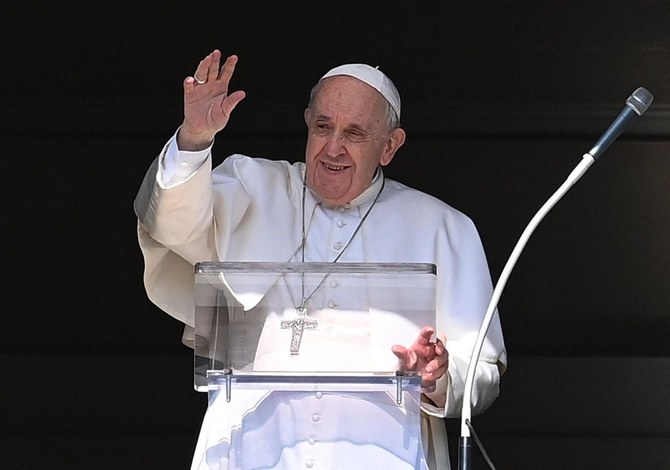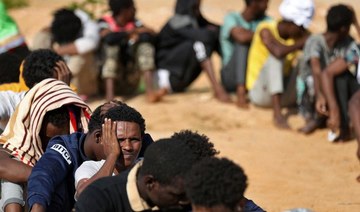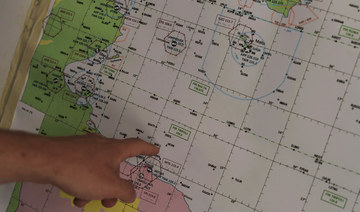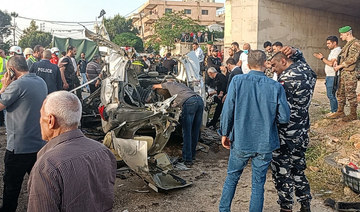VATICAN CITY: Pope Francis on Sunday made an impassioned plea to end the practice of returning migrants rescued at sea to Libya and other unsafe countries where they suffer “inhumane violence.”
Francis also waded into a highly contentious political debate in Europe, calling on the international community to find concrete ways to manage the “migratory flows” in the Mediterranean.
“I express my closeness to the thousands of migrants, refugees and others in need of protection in Libya,” Francis said. ”I never forget you, I hear your cries and I pray for you.”
Even as the pontiff appealed for changes of migrant policy and of heart in his remarks to the public in St. Peter’s Square, hundreds of migrants were either at sea in the central Mediterranean awaiting a port after rescue or recently coming ashore in Sicily or the Italian mainland after setting sail from Libya or Turkey, according to authorities.
“So many of these men, women and children are subject to inhumane violence,” he added. ”Yet again I ask the international community to keep the promises to search for common, concrete and lasting solutions to manage the migratory flows in Libya and in all the Mediterranean.”
“How they suffer, those who are sent back” after rescue at sea, the pope said. Detention facilities in Libya, he said “are true concentration camps.”
“We need to stop sending back (migrants) to unsafe countries and to give priority to the saving of human lives at sea with protocols of rescue and predictable disembarking, to guarantee them dignified conditions of life, alternatives to detention, regular paths of migration and access to asylum procedures,” Francis said.
UN refugee agency officials and human rights organizations have long denounced the conditions of detention centers for migrants in Libya, citing practices of beatings, rape and other forms of torture and insufficient food. Migrants endure weeks and months of those conditions, awaiting passage in unseaworthy rubber dinghies or rickety fishing boats arranged by human traffickers.
Hours after the pope’s appeal, the humanitarian organization Doctors Without Borders said that its rescue ship, Geo Barents, reached a rubber boat that was taking on water, with the sea buffeted by strong winds and waves up to three meters (10 feet) high. It tweeted that “we managed to rescue all the 71 people on board.”
The group thanked the charity group Alarm Phone for signaling that the boat crowded with migrants was in distressed.
Earlier, Geo Barents, then with 296 migrants aboard its rescue ship, was awaiting permission in waters off Malta to disembark. Six migrants tested positive for COVID-19, but because of the crowded conditions aboard, it was difficult to keep them sufficiently distant from the others, Doctors Without Borders said.
In Sicily, a ship operated by the German charity Sea-Watch, with 406 rescued migrants aboard, was granted permission to enter port. But Sea-Watch said that a rescue vessel operated by a Spanish charity, with 105 migrants aboard, has been awaiting a port assignment to disembark them for four days.
While hundreds of thousands of migrants have departed in traffickers’ boats for European shores in recent years and set foot on Sicily or nearby Italian islands, many reach the Italian mainland.
Red Cross officials in Roccella Ionica, a town on the coast of the “toe” of the Italian peninsula said on Sunday that about 700 migrants, some of them from Afghanistan, reached the Calabrian coast in recent days on boats that apparently departed from Turkey.
Authorities said so far this year, about 3,400 migrants had reached Roccella Ionica, a town of 6,000 people, compared to 480 in all of 2019. The migrants who arrived in the last several days were being housed in tent shelters, RAI state television said.
Italy and Malta have come under criticism by human rights advocates for leaving migrants aboard crowded rescue boats before assigning them a safe port.
The Libyan coast guard, which has been trained and equipped by Italy, has also been criticized for rescuing migrants in Libyan waters and then returning them to land where the detention centers awaited them.
On Friday, Doctors Without Borders tweeted that crew aboard the Geo Barents had “witnessed an interception” by the Libyan coast guard and that the migrants “”will be forcibly taken to dangerous detention facilities and exposed to violence and exploitation.”
With rising popularity of right-wing, anti-migrant parties in Italy in recent years, the Italian government has been under increasing domestic political pressure to crack down on illegal immigration.
Italy and Malta have lobbied theirs European Union partner countries, mainly in vain, to take in some of those rescued at sea.
Pope: Don’t send migrants back to Libya and ‘inhumane’ camps
https://arab.news/n4yj3
Pope: Don’t send migrants back to Libya and ‘inhumane’ camps

35,562 Palestinians killed in Gaza offensive since Oct. 7 — health ministry

DUBAI: More than 35,562 Palestinians have been killed and 79,652 injured in the Israeli military offensive on Gaza since Oct. 7, the Gaza health ministry said in a statement on Monday.
One hundred and six Palestinians were killed and 176 injured in the past 24 hours, the ministry added.
Source close to Hezbollah says 4 dead in Israeli strikes on Lebanon

- The source close to Hezbollah told AFP that “at least four Hezbollah fighters were killed in Israeli raids on two different sites in southern Lebanon“
- The Israeli military said fighter jets struck “a Hezbollah terrorist cell”
BEIRUT: A source close to Hezbollah said four fighters were killed Monday in south Lebanon, with the Iran-backed group announcing two dead and a retaliatory attack, while Israel claimed strikes.
Hezbollah, a Hamas ally, has traded near daily cross-border fire with Israeli forces since the Palestinian group’s October 7 attack on southern Israel that sparked the war in Gaza.
The source close to Hezbollah told AFP that “at least four Hezbollah fighters were killed in Israeli raids on two different sites in southern Lebanon,” identifying the locations as Naqura on the coast and Mais Al-Jabal, a border village to the east.
The Shiite Muslim movement said two of its fighters, both from Naqura, had been killed, without providing further details.
The Israeli military said fighter jets struck “a Hezbollah terrorist cell” and a launch post in the Mais Al-Jabal area, while Israeli army “artillery fired to remove a threat” in the Naqura area.
Hezbollah said it launched a heavy rocket attack at an Israeli army barracks in the country’s north “in retaliation” for the Naqura strike, while also announcing other attacks on Israeli positions.
Lebanon’s official National News Agency (NNA) reported Israeli strikes on Mais Al-Jabal and Naqura, where it said Israel fired near Hezbollah-affiliated rescue personnel and wounded a civilian.
The fighting has killed at least 423 people in Lebanon, mostly militants but also including 82 civilians, according to an AFP tally.
Israel says 14 soldiers and 11 civilians have been killed on its side of the border.
The violence has raised fears of all-out conflict between Hezbollah and Israel, which went to war in 2006.
War monitor says Israeli strikes kill six pro-Iran fighters in Syria

- A Hezbollah source said that at least one fighter from the group was killed in Israeli strikes in the Qusayr area
Beirut: A war monitor said at least six pro-Iran fighters were killed Monday in Israeli strikes in Syria near the Lebanese border, in an area where Lebanon’s powerful Hezbollah group holds sway.
The Syrian Observatory for Human Rights said “Israeli strikes targeted two positions of pro-Iran groups in the Homs region,” including “a Hezbollah site in the Qusayr area” near the border where “six Iran-backed fighters were killed.”
The Observatory did not specify their nationalities.
A Hezbollah source told AFP that at least one fighter from the group was killed in Israeli strikes in the Qusayr area.
Israel rarely comments on individual strikes in Syria but has repeatedly said it will not allow its arch-enemy Iran to expand its presence there.
On Saturday, the Observatory said an Israeli drone strike near the Lebanese border targeted a vehicle carrying “a Hezbollah commander and his companion,” without reporting casualties.
Hezbollah did not announce any deaths among its ranks on Saturday.
On May 9, Israeli strikes on Syria targeted facilities belonging to Iraq’s Al-Nujaba armed movement, the Observatory and the pro-Iran group said, with Damascus saying an unidentified building was attacked.
The Israeli military has carried out hundreds of strikes in Syria since the outbreak of the civil war in its northern neighbor in 2011, mainly targeting army positions and Iran-backed fighters including from Lebanon’s Hezbollah group.
But the strikes increased after Israel’s war with Hamas in the Gaza Strip began on October 7, when the Iran-backed Palestinian militant group launched an unprecedented attack against Israel.
Syria’s war has killed more than half a million people and displaced millions more since it erupted in 2011 after Damascus cracked down on anti-government protests.
ICC prosecutor seeks arrest warrant for Israeli and Hamas leaders, including Netanyahu

- Karim Khan believes Benjamin Netanyahu, Yoav Gallant and three Hamas leaders are responsible for war crimes and crimes against humanity
THE HAGUE, Netherlands: The chief prosecutor of the International Criminal Court said Monday he is seeking arrest warrants for Israeli and Hamas leaders, including Israeli Prime Minister Benjamin Netanyahu, in connection with their actions during the seven-month war between Israel and Hamas.
Karim Khan said that he believes Netanyahu, his defense minister Yoav Gallant and three Hamas leaders — Yehia Sinwar, Mohammed Deif and Ismail Haniyeh — are responsible for war crimes and crimes against humanity in the Gaza Strip and Israel.
The prosecutor must request the warrants from a pre-trial panel of three judges, who take on average two months to consider the evidence and determine if the proceedings can move forward.
Israel is not a member of the court, and even if the arrest warrants are issued, Netanyahu and Gallant do not face any immediate risk of prosecution. But Khan’s announcement deepens Israel’s isolation as it presses ahead with its war, and the threat of arrest could make it difficult for the Israeli leaders to travel abroad.
Both Sinwar and Deif are believed to be hiding in Gaza as Israel tries to hunt them down. But Haniyeh, the supreme leader of the Islamic militant group, is based in Qatar and frequently travels across the region.
There was no immediate comment from either side.
Israel launched its war in response to an Oct. 7 cross-border attack by Hamas that killed some 1,200 people, mostly civilians, and took 250 others hostage. The Israeli offensive has killed over 35,000 Palestinians, at least half of them women and children, according to the latest estimates by Gaza health officials. The Israeli offensive has also triggered a humanitarian crisis in Gaza, displacing roughly 80 percent of the population and leaving hundreds of thousands of people on the brink of starvation, according to UN officials.
Speaking of the Israeli actions, Khan said in a statement that “the effects of the use of starvation as a method of warfare, together with other attacks and collective punishment against the civilian population of Gaza are acute, visible and widely known. ... They include malnutrition, dehydration, profound suffering and an increasing number of deaths among the Palestinian population, including babies, other children, and women.”
The United Nations and other aid agencies have repeatedly accused Israel of hindering aid deliveries throughout the war. Israel denies this, saying there are no restrictions on aid entering Gaza and accusing the United Nations of failing to distribute aid. The UN says aid workers have repeatedly come under Israeli fire, and also says ongoing fighting and a security vacuum have impeded deliveries.
Of the Hamas actions on Oct. 7, Khan, who visited the region in December, said that he saw for himself “the devastating scenes of these attacks and the profound impact of the unconscionable crimes charged in the applications filed today. Speaking with survivors, I heard how the love within a family, the deepest bonds between a parent and a child, were contorted to inflict unfathomable pain through calculated cruelty and extreme callousness. These acts demand accountability.”
After a brief period of international support for its war, Israel has faced increasing criticism as the war has dragged on and the death toll has climbed.
Israel is also facing a South African case in the International Court of Justice accusing Israel of genocide. Israel denies those charges.
Israel intends to broaden Rafah sweep, Defense Minister Gallant tells Washington

- After weeks of public disagreements with Washington over the Rafah planning, Israel on May 6 ordered Palestinian civilians to evacuate parts of the city and began troop and tank incursions.
JERUSALEM: Israel intends to broaden its military operation in Rafah, Defense Minister Yoav Gallant on Monday told a senior aide to US President Joe Biden, who has warned against major action in the southern Gazan city that may risk mass civilian casualties.
Israel describes Rafah, which abuts the Gaza Strip’s border with the Egyptian Sinai, as the last stronghold of Hamas Islamists whose governing and combat capabilities it has been trying to dismantle during the more than seven-month-old war.
After weeks of public disagreements with Washington over the Rafah planning, Israel on May 6 ordered Palestinian civilians to evacuate parts of the city and began troop and tank incursions.
“We are committed to broadening the ground operation in Rafah to the end of dismantling Hamas and recovering the hostages,” a statement from Gallant’s office quoted him as telling visiting US National Security Adviser Jake Sullivan.
Israel believes dozens of hostages from the cross-border Hamas rampage on Oct. 7 are being held in Rafah.
Western powers and Egypt have voiced concern for the fate of hundreds of thousands of displaced Palestinians sheltering there, despite Israeli assurances about humanitarian safeguards.
The UN agency for Palestinian refugees UNRWA said on Monday that it estimated 810,000 people had fled Rafah since May 6 — potentially more than half of the city’s wartime population.
There was no immediate US comment on the Gallant talks.
The statement from Gallant’s office said he “presented to (National Security) Adviser Sullivan the provisions Israel implemented for evacuating the population from the Rafah area and for setting up the appropriate humanitarian response.”
Israel says its forces in Rafah have discovered dozens of tunnels from the Sinai, a potential embarrassment for Cairo. The Egyptian state information service has previously dismissed speculation about cross-border smuggling to Gaza as “lies.”




















